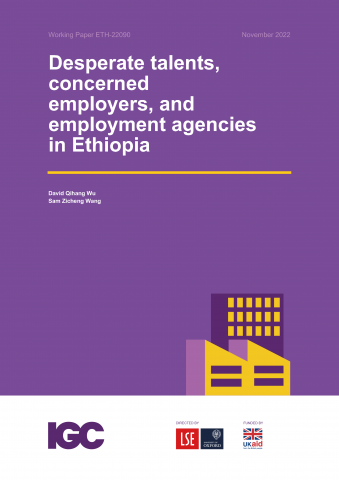Desperate talents, concerned employers, and employment agencies in Ethiopia
We conduct an intervention on a random subset of firms where an major employment agency recommends a qualified applicant for each treated vacancy. We find that treated firms see a 21% increase in hiring at least one worker within one month, and the treatment effect concentrates in jobs requiring vocational training certificates where hiring inefficiency is more severe.
-
Wu et al Working Paper November 2022
PDF document • 4 MB
High unemployment among college graduates is a pressing issue of many developing countries. In Addis Ababa, Ethiopia, suggestive evidence shows private firms avoid hiring college graduates because employers are concerned of early turnover when college graduates find a better offer outside. An emerging type of labor market intermediary, employment agency, provide jobs for college graduates and may send a credible signal to employers of applicants’ lack of outside offers. We sample 400 private formal firms that are actively hiring in Addis Ababa to test the role of employment agency on firms’ hiring outcomes. We conduct an intervention on a random subset of 197 firms where an major employment agency recommends a qualified applicant for each treated vacancy. We find that treated firms see a 21% increase in hiring at least 1 worker within 1 month, and the treatment effect concentrates in jobs requiring vocational training certificates where hiring inefficiency is more severe. College graduates from employment agencies are more likely to be interviewed in the treated firms compared to college graduates from non-agency hiring channels. We find suggestive evidence that the hired workers in treated firms who post jobs requiring vocational training certificates are no more likely to quit, with higher productivity, are less likely to have absent days, and are able to negotiate a higher salary.




